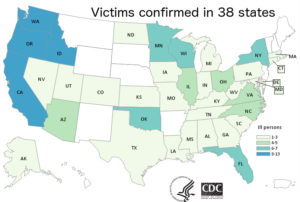A reported illness in North Carolina and state testing that showed Salmonella contamination spurred the Pious Lion company to recall an undisclosed volume of kratom products.
 “This is a very serious issue and consumers should take immediate action if they have these products in their homes. Consumers are advised to discard these products and are warned not to consume them,” said Joe Reardon, assistant commissioner of regulatory programs for the North Carolina agriculture department.
“This is a very serious issue and consumers should take immediate action if they have these products in their homes. Consumers are advised to discard these products and are warned not to consume them,” said Joe Reardon, assistant commissioner of regulatory programs for the North Carolina agriculture department.
The Asheville, NC, company said in a news release and on its Facebook page that it does not agree with the test results from North Carolina Department of Agriculture and Consumer Services Rapid Response Team.
“Due to concerns about salmonella tainted kratom products, we sent samples of our 9 strains to an independent 3rd party lab for testing. The results just came back and we’re pleased to inform you that all 9 samples came back negative for salmonella,” according to the Pious Lion statement.
The company is recalling two products:
- Pious Lion Pure Premium Potent Limited Release Pink Bali, 1-ounce packages; and
- Pious Lion Pure Premium Potent White Maeng DA, Bright Uplifting Energy, 4-ounce packages.
“Consumers should immediately stop using these products,” according to the Pious Lion statement.
“Any containers used to store the kratom product should be thoroughly washed and sanitized. In order to prevent cross-contamination, consumers should wash their hands, work surfaces and utensils thoroughly after contact with these products, and not prepare any food in the area at the same time.”
The company may have distributed the implicated kratom products in other sized packages, according to North Carolina officials. None of the Pious Lion products have any labeling codes that consumers can use to identify the recalled kratom.
North Carolina’s agriculture department received notification from the state health department about an illnesses that had been reported in relation to Pious Lion kratom. The agriculture department collected samples of Pious Lion kratom from a retail location.
Retail distribution details for the recalled kratom were not immediately available. Pious Lion sells its products online and by telephone, according to its website.
The U.S. Food and Drug Administration, the Centers for Disease Control and other states have been investigating Salmonella infections associated with a variety of kratom products, resulting in multiple recalls of different kratom products. Because no common source of Salmonella-contaminated kratom has been identified, the FDA and CDC are recommending against consuming kratom.
Anyone who has consumed any kratom products and developed symptoms of Salmonella infection should seek medical attention and tell their doctors about their possible exposure to the pathogen. Symptoms can include nausea, vomiting, diarrhea or bloody diarrhea, abdominal cramping and fever.
Salmonella infection, called salmonellosis, can cause serious and sometimes fatal infections in young children, frail or elderly people, and others with weakened immune systems, according to the CDC.
Current outbreak
A Salmonella outbreak traced to kratom products continues to sicken people across the United States, with the CDC reporting a 50 percent increase in the case count in the past three weeks.
The 132 people confirmed as of April 6 with the outbreak strains of Salmonella are spread across 38 states from coast to coast. No deaths have been confirmed, but 40 percent of the victims have required hospitalization, according to the Centers for Disease Control and Prevention. Three additional states reported ill people, with Connecticut, Iowa and Idaho now reporting confirmed victims.
Of the victims interviewed by epidemiologists investigation the outbreak, 73 percent said they consumed kratom in pills, powder, or tea before they became infected. Most people report consuming the powder form of kratom. People who reported consuming kratom said they bought it from retail locations in several states and from various online retailers.
(To sign up for a free subscription to Food Safety News, click here.)

